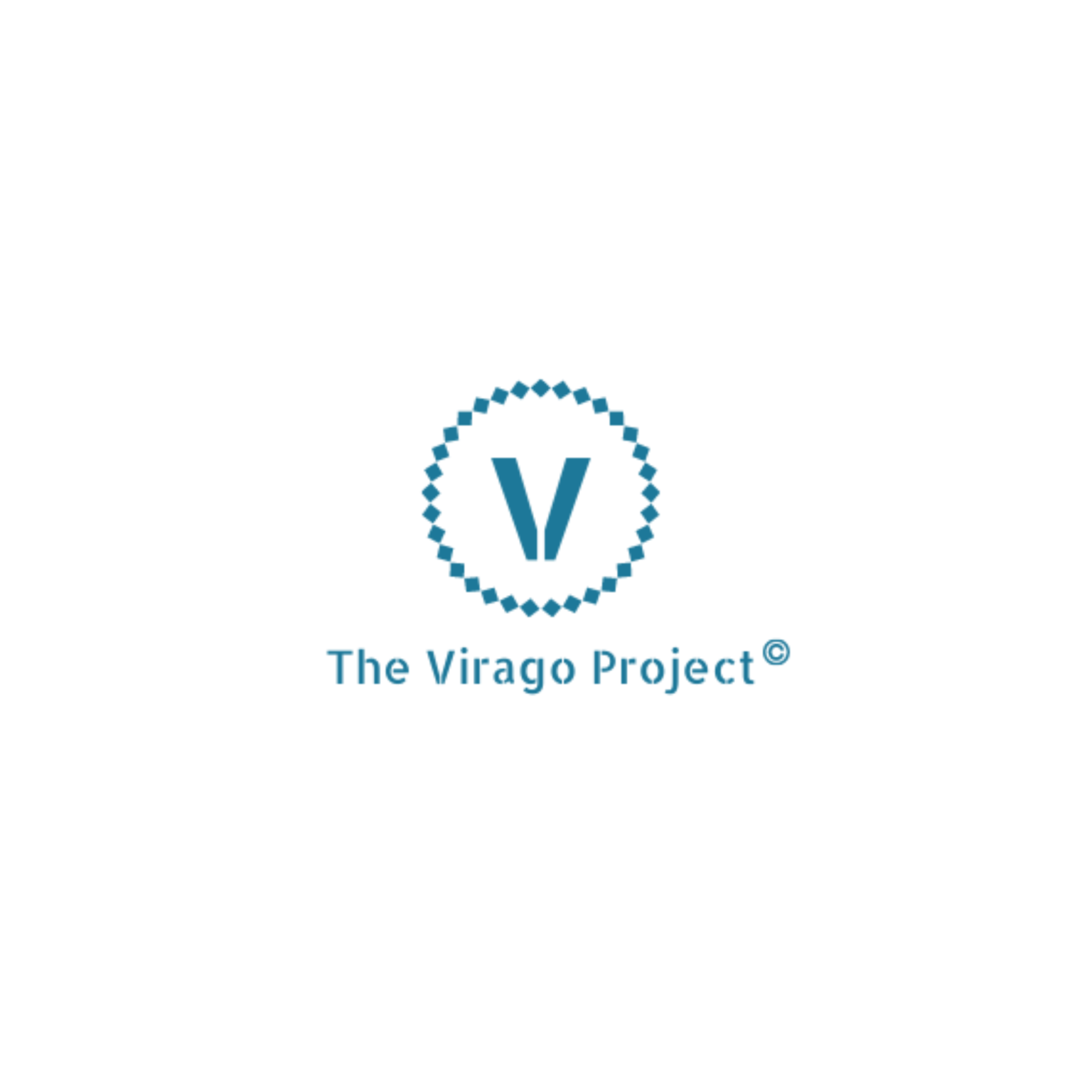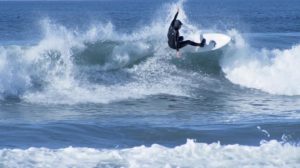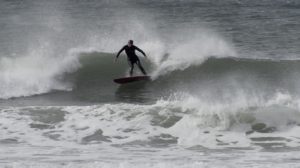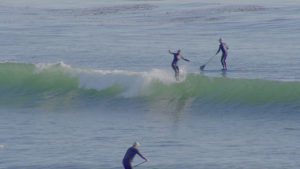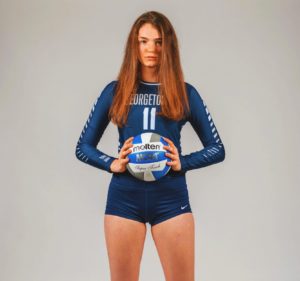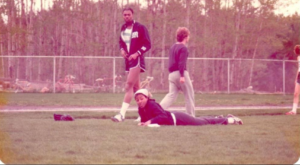Kaira Wallace is a University of California, Santa Barbara graduate who competed on the surf team and studied Earth Science with an emphasis on climate and environment. She surfs as often as she can and hopes to pursue a career in climate change mitigation.
“Growing up in a place with freezing water and very few other women to share the surf with was a huge obstacle when I was younger. The lineups felt unfriendly and it was hard to feel like you belonged there when you were surrounded by burly men battling for waves. As I have grown up, I have found my tribe of women to shred with and we have carved out a spot for ourselves in the lineup. Now I tend to seek out those places where I wouldn’t typically belong, regardless of the obstacles ahead. Surfing gifted me with that ability and confidence to take things heads on.” -Kaira Wallace for Sea Together Magazine (a global art project that “transcends boundaries placed upon women surfers in our worldwide patriarchal surf culture”).
Kaira started surfing around the age of four in her hometown of Half Moon Bay, California. Her father and older brother introduced her to the sport, but it was not until she connected with other girls on her middle school surf team did the passion really click, and surfing solidified as a major part of her life. Below is a conversation I had with Kaira about what it means to be a female surfer, the connection between surfing and mental health, and her advice for young surfer girls in future lineups.
Before you found your Middle School girl gang to surf with, what did it feel like to be a young girl in the water?
When I was younger, it definitely was less motivating if it was just my dad taking me out. The water was cold and I was like, “why am I doing this?” But looking back at it, once I had those other girls in Middle School was when I found that self-motivation. I was doing it for fun because my friends were doing it with me and I think that was the key difference.
How would you describe the gender dynamics in the water? What is it like to be a female surfer?
It’s pretty clear the disparity in most lineups. You get out there and nine out of ten times it’s just you with a bunch of other guys. That’s just the way it is in most places. It is getting better – every year there are more girls in the water. But for the most part if you’re going out alone, it’s probably just going to be you and a bunch of guys.
You get into the lineup and there’s this aggressive feel to it when there’s no other women in the lineup. Everyone’s serious and it’s very macho. I know that whenever I first paddle out and I’m the only girl out there, I can feel people watching me because they’re like, “what is this girl doing out here?”, “does she know what she’s doing?”, “is she going to be able to keep up with us?” And so I know that whenever I first paddle out, I always tell myself the first wave has to be a good one because I know that the guys are going to be watching me and sizing me up. They’re going to be figuring out if they need to back off waves I’m going for. So I always tell myself I have to make my first wave a good one because that sets their opinions of me for the rest of the session. That is the way that it functions out there – it is such a competitive feeling when I am the only girl in the water.
So a lot of times I just tell myself, “I deserve a spot in this lineup … there’s no reason I shouldn’t be out here … I’m just as good as the other guys.” So a lot of it is just knowing you’re going to be watched and having that confidence to go out there anyway.
Is there a story you can share about times that being a female surfer has been particularly challenging or when your gender has really influenced your time in the sport?
There are a lot of times when I feel very aware that I’m the only girl in the lineup, especially when I get certain comments from guys in the water. Maybe I haven’t been surfing the best that session or maybe I haven’t been getting the best waves and guys will paddle by me and say, “getting any waves?” and I’m like, “why are you asking me that? You don’t ask any other guys in the lineup that question.” Guys will come up to you and say “whatever wave I’m on feel free to go on my waves.” And I’m like, “why do you need to tell me that? I’m perfectly capable of getting my own waves. I don’t need you to give me any waves. You wouldn’t do that to anyone else in the lineup – you’re just telling me that because I’m a girl.” Certain comments like that really put me off. I want to be treated like anybody else in the water. I don’t need your help. I don’t need waves from you. It definitely is something that bugs me and makes me feel weird about being out there. Just treat me like any other person in the lineup.
On a more positive note, can you talk about what it is like to have other girls in the water, especially if they’re friends of yours and what that connection feels like?
It’s the absolute best having other girls in the water. It makes the session feel completely different. You go from this feeling of aggression and competitiveness and when you have other girls in the water, it’s so fun and lighthearted and you’re giggling with each other and you don’t care if people are looking at you because you’re just hanging out and having fun. It just changes the whole dynamic of the lineup and other guys can sense that too. You’re not taking yourself too seriously – you’re just out there having fun.
It also brings so much confidence having your other girls in the lineup. If you get a good wave, your friends are cheering for you and it’s just the best feeling having other ladies to surf with.
Can you talk a bit about how that’s translated to who you are outside of the water and how surfing has influenced who you are?
Surfing has had a huge impact on who I am. It’s given me so much confidence in my day-to-day life. Outside of the water I’m a pretty quiet person. I can be a bit of an introvert, but surfing has forced me out of that shell even when I don’t want it to. Surfing has made me branch out a bit and find friends where I maybe wouldn’t have otherwise. And all of that just feeds into personal confidence. [Surfing] has forced me to be a more bold person and go for things that maybe I wouldn’t have before. Surfing definitely makes you want to go after life a little bit more.
The Virago Project focuses on the mental well-being of female athletes. What relationship do you think surfing has played in your mental health and your journey of who you are?
Surfing has had such a positive impact on my mental health, especially through this whole pandemic. Everyone is struggling so much, myself included, but having that ability to get away from anything that’s happening in your life on land and just get in the water, be forced to be present for an hour, makes a huge difference in how I feel for the rest of the day. It’s such a relief from anything that’s been weighing me down and I can just forget about it for an hour or two and feel so present and not worry about anything else. It’s the best feeling and I’m so grateful that I’ve had surfing throughout this past year to just go and not think about anything except catching waves to clear my head.
My final question is what advice would you give to a young female surfer paddling out into a male-dominated lineup?
Remember that you don’t need to take all of this so seriously. Surfing is for fun and people who get all wrapped up in being the best surfer in the water or getting all the best waves are probably not having the most fun. Just go out there and know that you have a place in that lineup and that you deserve a place in that lineup and just go have fun. Don’t worry about all the other stuff.
Are there any final comments you want to make before we end our conversation?
Even though it’s hard sometimes to be the only girl in the lineup, now that I’ve gotten to a point where I have that confidence that’s grown over the last few years, it’s almost like a source of power in the lineup. Being solo out there as a girl, you know that you have this power that not a lot of people have. You have this confidence to be out there and you can feed off of it knowing that the guys are watching you and you do a really sick turn. So you can turn it into something that makes you feel better. I see it as a powerful and positive thing.
Written by Ellie Greenberg.
